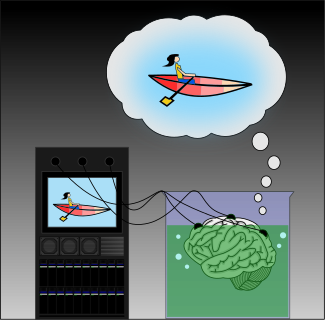
In the first "Matrix" movie we are given a version of the old "brain in a vat" problem. Neuro-philosopher David Chalmers writes:
"The Matrix presents a version of an old philosophical fable: the brain in a vat. A disembodied brain is floating in a vat, inside a scientist's laboratory. The scientist has arranged that the brain will be stimulated with the same sort of inputs that a normal embodied brain receives. To do this, the brain is connected to a giant computer simulation of a world. The simulation determines which inputs the brain receives. When the brain produces outputs, these are fed back into the simulation. The internal state of the brain is just like that of a normal brain, despite the fact that it lacks a body. From the brain's point of view, things seem very much as they seem to you and me." (Chalmers, The Matrix as Metaphysics)
How do we know we are not really just a brain hooked up to a computer? I now believe I am typing on my laptop's keyboard. I believe I see letters formed on the computer screen. But if I am only a brain in a vat, all this is as unreal as Neo's beliefs that he lives in a city, has hair, and works in an office.
Philosopher Evan Fales gives this proof that neither I, nor you, are brains being manipulated by a computer. ('BIV' stands for "brain in a vat.")
1. If I were a BIV, I could not think the proposition: “I am a BIV.”
2. I can think the proposition: “I am a BIV.”
3. Therefore, I am not a BIV.
(In L. Walls and Trent Dougherty. Two Dozen (or so) Arguments for God: The Plantinga Project. Evan Fales, "The Putnamian Argument (the Argument from the Rejection of Global Skepticism) [also, (O) The Argument from Reference, and (K) The Argument from the Confluence of Proper Function and Reliability] PUTNAM’S SEMANTIC SKEPTICISM AND THE EPISTEMIC MELT-DOWN OF NATURALISM: HOW DEFEAT OF PUTNAM’S PUZZLE PROVIDES A DEFEATER FOR PLANTINGA’S SELF-DEFEAT ARGUMENT AGAINST NATURALISM.")
The argument is logically sound. That is, if the premises are true, the conclusion follows deductively.
Premise 1 is true. A proposition is a statement that is either true or false. If I am a BIV I could not, in principle, think (know) I am a BIV, since all I think is manipulated and illusory.
Premise 2 is true. In the same way, I can think "I am a unicorn,: or "I am a tree frog."
Fales explains:
"This argument wouldn’t offer a defense against BIV skepticism if metaphysical realism were true. According to the metaphysical realist, there is a way the world is, independently of what we think, a way that satisfies some One True and Complete Description. That one true description is what one would know if one had, as it were, a God’s-eye view of the world. (From such a perspective as that, it might turn out that I am, after all, a BIV. But if I am, then I couldn’t have the thought that I’m a BIV. To be sure, it would be possible for me to have a thought that is notionally the same as the God’s-eye thought that I, Evan, am a BIV. But my thought wouldn’t represent, or express, the same proposition, because, if I am a BIV, I wouldn’t be able to think about vats— or brains, for that matter.)"
Therefore - and it is indeed good news - you are not a brain in a vat.